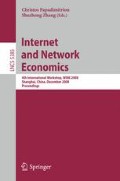Abstract
A common objective in mechanism design is to choose the outcome (for example, allocation of resources) that maximizes the sum of the agents’ valuations, without introducing incentives for agents to misreport their preferences. The class of Groves mechanisms achieves this; however, these mechanisms require the agents to make payments, thereby reducing the agents’ total welfare.
In this paper we introduce a measure for comparing two mechanisms with respect to the final welfare they generate. This measure induces a partial order on mechanisms and we study the question of finding minimal elements with respect to this partial order. In particular, we say a non-deficit Groves mechanism is welfare undominated if there exists no other non-deficit Groves mechanism that always has a smaller or equal sum of payments. We focus on two domains: (i) auctions with multiple identical units and unit-demand bidders, and (ii) mechanisms for public project problems. In the first domain we analytically characterize all welfare undominated Groves mechanisms that are anonymous and have linear payment functions, by showing that the family of optimal-in-expectation linear redistribution mechanisms, which were introduced in [6] and include the Bailey-Cavallo mechanism [1,2], coincides with the family of welfare undominated Groves mechanisms that are anonymous and linear in the setting we study. In the second domain we show that the classic VCG (Clarke) mechanism is welfare undominated for the class of public project problems with equal participation costs, but is not undominated for a more general class.
Access this chapter
Tax calculation will be finalised at checkout
Purchases are for personal use only
Preview
Unable to display preview. Download preview PDF.
References
Bailey, M.J.: The demand revealing process: to distribute the surplus. Public Choice 91, 107–126 (1997)
Cavallo, R.: Optimal decision-making with minimal waste: Strategyproof redistribution of VCG payments. In: International Conference on Autonomous Agents and Multi-Agent Systems (AAMAS), Hakodate, Japan, pp. 882–889 (2006)
Faltings, B.: A budget-balanced, incentive-compatible scheme for social choice. In: Faratin, P., Rodríguez-Aguilar, J.-A. (eds.) AMEC 2004. LNCS, vol. 3435, pp. 30–43. Springer, Heidelberg (2006)
Green, J., Laffont, J.-J.: Characterization of satisfactory mechanisms for the revelation of preferences for public goods. Econometrica 45, 427–438 (1977)
Guo, M., Conitzer, V.: Better redistribution with inefficient allocation in multi-unit auctions with unit demand. In: Proceedings of the ACM Conference on Electronic Commerce (EC), Chicago, IL, USA (2008)
Guo, M., Conitzer, V.: Optimal-in-expectation redistribution mechanisms. In: AAMAS 2008: Proc. of 7th Int. Conf. on Autonomous Agents and Multi Agent Systems (2008)
Guo, M., Conitzer, V.: Undominated VCG redistribution mechanisms. In: AAMAS 2008: Proc. of 7th Int. Conf. on Autonomous Agents and Multi Agent Systems (2008)
Guo, M., Conitzer, V.: Worst-case optimal redistribution of VCG payments in multi-unit auctions. Games and Economic Behavior, doi:10.1016/j.geb.2008.06.007
Holmstrom, B.: Groves’ scheme on restricted domains. Econometrica 47(5), 1137–1144 (1979)
Mas-Collel, A., Whinston, M., Green, J.: Microeconomic Theory. Oxford University Press, Oxford (1995)
Moore, J.: General Equilibrium and Welfare Economics: An Introduction. Springer, Heidelberg (2006)
Moulin, H.: Axioms of Cooperative Decision Making. Cambridge University Press, Cambridge (1988)
Moulin, H.: Efficient, strategy-proof and almost budget-balanced assignment, Working Paper (March 2007)
Porter, R., Shoham, Y., Tennenholtz, M.: Fair imposition. Journal of Economic Theory 118, 209–228 (2004)
Author information
Authors and Affiliations
Editor information
Editors and Affiliations
Rights and permissions
Copyright information
© 2008 Springer-Verlag Berlin Heidelberg
About this paper
Cite this paper
Apt, K., Conitzer, V., Guo, M., Markakis, E. (2008). Welfare Undominated Groves Mechanisms . In: Papadimitriou, C., Zhang, S. (eds) Internet and Network Economics. WINE 2008. Lecture Notes in Computer Science, vol 5385. Springer, Berlin, Heidelberg. https://doi.org/10.1007/978-3-540-92185-1_48
Download citation
DOI: https://doi.org/10.1007/978-3-540-92185-1_48
Publisher Name: Springer, Berlin, Heidelberg
Print ISBN: 978-3-540-92184-4
Online ISBN: 978-3-540-92185-1
eBook Packages: Computer ScienceComputer Science (R0)

